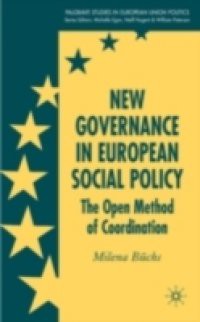The European Union is widely regarded as premised on an imbalance between market-making and market-correcting provisions, potentially weakening national welfare systems and the political legitimacy of the European project. However, a stronger role for the EU in social policy faces considerable difficulties. The Open Method of Coordination (OMC) represents a new governance approach to European social policy and was adopted in the late 1990s. It seeks to provide a 'middle-way' solution to the dilemma of European social policy in which the EU adopts a stronger role in coordinating member states' social policies while member states formally retain their authority in social policy.New Governance in European Social Policy explores the effectiveness and legitimacy of a new policy tool in European social policy, the Open Method of Coordination (OMC). It analyses the tensions within the OMC's goals and instruments, develops an explanation of its functioning and applies a multifaceted framework for its evaluation.

